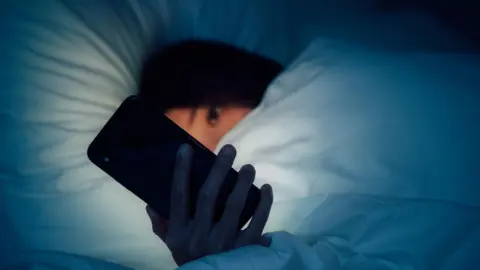Worse sleepy bed screen time, they find work

Technology reporter
 Getty Images
Getty ImagesAccording to a study, people who spend more time to look at a screen in bed are more likely to report insomnia and sleep loss.
The research is based on the Norwegian questionnaire of more than 45,000 students.
Each additional clock shows that the screen time depends on an increase of 63% in insomnia and is less asleep less than 24 minutes.
However, the researchers said that they only created a correlation between the use of screen use and lower sleep quality, and they did not show that the first one caused the second.
Experts say that quitting your phone before going to bed, doing something relaxing, and routine can help improve sleep.
The researchers behind the study based on the national representative survey data of the 18-28-year-old students gathered in 2022 wanted to examine the connection between the amount of time spent using screens in bed and sleep patterns.
They also tried to investigate the effect of using social media on the sleep compared to other screen activities.
Dr. Gunnhild Johnsen Hjetland of the Norway, the Chief author of the study, Norway Public Health Institute – Published on a Frontiers Journal – He said that the type of screen activity looks less effective than the screen time in general.
“We could not find a significant difference between social media and other screen activities, which shows that screen use is the key factor in sleep cuts,” he said.
Sleep or Social Media
2022 Norway Health and Welfare Research asked the participants to determine whether they used any digital media after going to bed.
Options include watching movies or TVs, checking social media, browse the internet and playing games.
69% of those who said that they used a screen in bed before sleep, social media and other screen -based activities, he said.
The participants were also asked to determine how many nights a week they would interact with such a media and how much time they fell or how they were asleep, and they were waking up early or fatigue.
He identified those who said that they had insomnia for at least three nights or days a week and at least three months.
While the study finds a connection between the use of screens before bedtime and sleeping cuts or insomnia, researchers say it does not mean that it is a reason.
“This work cannot determine the causality – for example, whether the use of screen use is causing insomnia or whether insomnia students use screens more,” he said.
They also state that the study may mean prejudices to rely on the survey data of self -reported experiences, and that their findings should not be considered globally representatives.
Joshua Piper, a sleeping clinician in painting UK, said that the study provides “valuable, assembly evidence” of the electronic device.
“It plays both the opportunity and the quality of your sleep, so some can fight for the beginning, others are fighting to stay asleep,” he said.
While people can try to reduce the effect by adjusting the screen brightness or using night mode, Mr. Piper said that previous studies were shifted with a device that would cause sleep cuts and interacted.
Tips for better sleep
It is believed that insomnia affects one of three people in England.
Sleep disorder is among a number of problems that people report that they live with sleep – telephone use and apocalypse was often accused late at night.
Although it is a widespread practice, the real effect of using social media or online content in bed on physical and mental health is discussed.
Nevertheless, experts recommend that people stop using digital devices shortly before trying to sleep.
They also say that going to bed and getting up at the same time every day can help improve sleep.
Mental Health Charity Institutions Mind And Rethink Instead of trying to force yourself to sleep, try to do something relaxing before sleeping such as breathing exercises, reading books or taking a bath.
They also recommend that they avoid caffeine, alcohol or large dishes before going to bed, to exercise gentle exercise and try to make your bedroom as more comfortable as possible.
Sleeping therapist Dr. Ktiderle, BBC’ye, especially in the morning, exposure to natural daylight is vital to help regulate our inner body clock, he said.
He could be the key to sleep better by doing a pleasant activity that is not very stimulus, as he said “busy, quit the day of thinking”.
The authors of this study reflect the need for more research on the subject, including researches conducted in areas such as long -term monitoring of sleep models and deterioration caused by device notifications.
“Together, such efforts can clarify the impact of the screen use on sleep without going to bed and inform the students and other population.”




